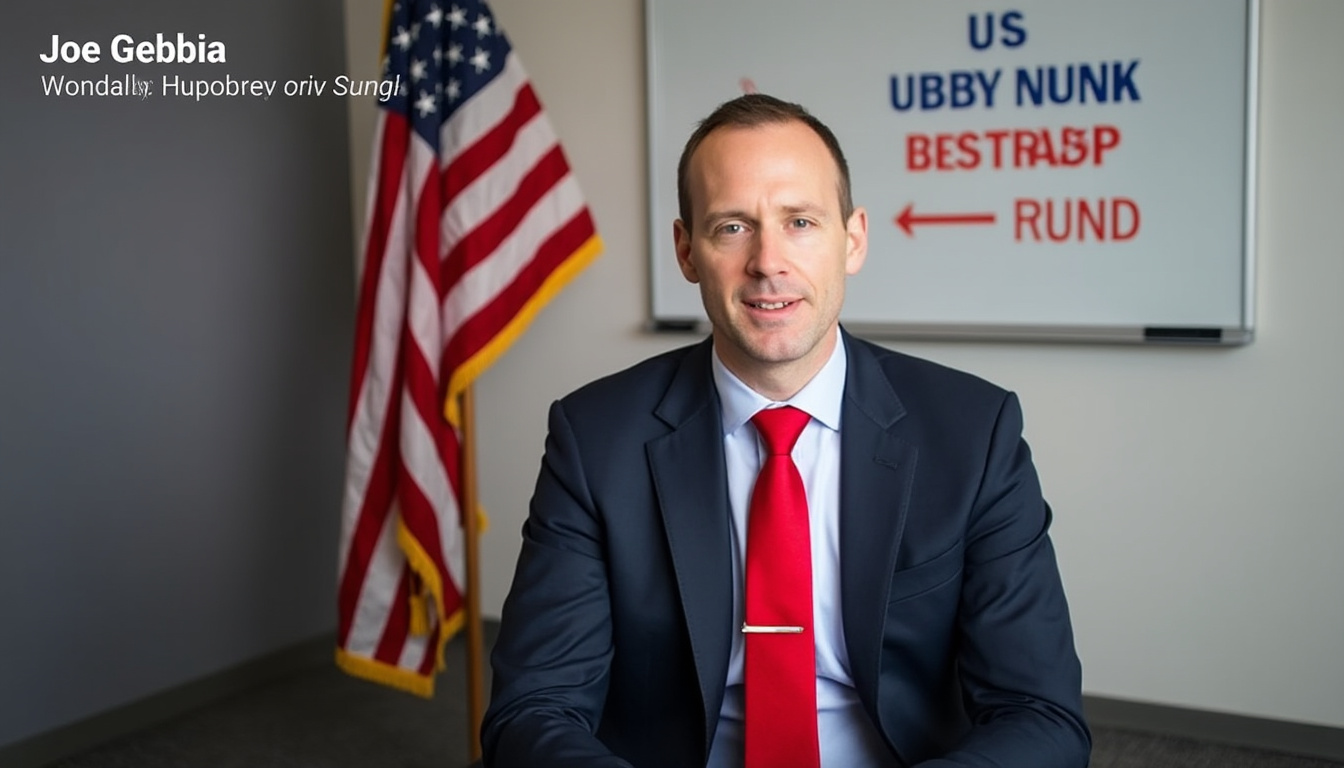Joe Gebbia, the co-founder of Airbnb, has recently made headlines not just for his historical contributions in the tech industry, but also for his significant political shift from supporting the Democratic Party to endorsing Donald Trump. This transition marks a notable change within an individual who has historically operated within the Silicon Valley dynamic, where liberal ideologies have traditionally dominated the conversation. Such a pivot reflects broader trends in the political landscape, emphasizing the increasing polarization and the impact of key issues like border security on individual political beliefs.
Understanding Joe Gebbia’s Political Shift
In a deep-dive interview, Gebbia articulated the primary motivations behind his departure from the Democratic Party. Central to his concerns was the issue of border security, which he cited as becoming increasingly problematic under President Joe Biden’s administration. With rising crime rates and a perceived lack of enforcement at the borders, Gebbia argued that the current policies were inadequate. This sentiment echoes a growing frustration among some voters who prioritize security over other liberal values.
Gebbia’s criticisms suggest that he believes the approach taken by the Democratic Party has lost touch with the realities facing American citizens. He expressed a compelling viewpoint during his conversation on « The Katie Miller Podcast, » indicating that he felt compelled to address the inadequacies of current immigration policies, which he views as permissive towards criminals and dangerous individuals. Gebbia stated, “I think, as I started to pull on that thread, I sort of began to look at other topics and eventually came to the point where I don’t think I can support a political party that wants to have an open border.” This perspective underlines the complex factors influencing voters who may have previously identified with more liberal ideologies.
Engaging with influential figures also played a pivotal role in Gebbia’s transformation. He reached out to notable Republicans, including Jared Kushner, seeking insights into the Republican approach to national issues. His conversations prompted him to reevaluate established beliefs, which is a testament to how dialogue can significantly impact one’s political orientation. This interaction highlights another crucial factor in political shifts — the importance of perspective shifts based on new information, especially from established leaders within opposing ideologies.
- Motivation for Shift: Border security concerns led to disillusionment with the Democratic Party.
- Engagement with Experts: Conversations with Republicans allowed for broader insight into political issues.
- Public Advocacy: Gebbia’s position as a tech leader positions his views to gain attention, influencing public discourse.

The Role of the Tech Industry in Political Alignment
The tech industry’s culture has long favored progressive values, making Gebbia’s departure from the Democratic fold particularly noteworthy. As co-founder of Airbnb, which has often aligned itself with liberal principles, Gebbia’s political pivot raises questions about the ideological flexibility of leaders within the tech sector. This shift prompts further examination of how personal experiences and perceived societal challenges can lead to significant political realignments.
In the context of 2024, the Trump Campaign offers a stark contrast to the prevailing sentiments in Silicon Valley. Gebbia’s support may signify a broader movement among tech entrepreneurs, reflecting a shift towards conservative values in response to social, economic, and political pressures. While traditional views may lead many in the tech industry to advocate for inclusivity, matters like border control seem to resonate with a growing faction that prioritizes safety as paramount.
The Impact of Political Views on Business Strategy
As Gebbia shifts his political allegiance, the implications for business strategy within Airbnb are worth scrutinizing. His co-founder, Brian Chesky, has often promoted a liberal ethos, advocating for values that align with diversity and social equality. The divergence in political views between key leadership figures can influence stakeholder perceptions, market positioning, and overall company culture.
Companies in the tech industry are frequently scrutinized for their political ties. Investors, customers, and employees have shown a growing interest in aligning with organizations that reflect their values. This shift in personal ideology could impact consumer engagement, potentially influencing users’ preferences when selecting a service like Airbnb. If Gebbia’s views are perceived as inconsistent with brand values, Airbnb could face backlash or loss of customer loyalty among its liberal user base.
Adjusting marketing strategies to reflect these new realities will be essential for Airbnb moving forward. This includes navigating the political waters delicately to maintain both stakeholder engagement and brand integrity. Airbnb’s recent distancing from Gebbia’s personal opinions symbolizes an attempt to reclaim its former image while managing the conflicting ideologies of its leaders.
- Consumer Engagement: Users may shift their loyalty based on perceived political alignment.
- Brand Integrity: Companies must balance leadership views with overall brand messaging.
- Investor Perception: Companies see greater scrutiny from investors related to their political stances.
Case Study: Airbnb’s Navigational Challenges
The case of Airbnb illuminates the challenges faced by tech companies navigating political terrain. With Gebbia’s support for Trump, Airbnb is placed in a position where it must manage its relationship with hosts and customers who may oppose such viewpoints. The *Democratic Party* has historically applauded Airbnb for its stance on social issues, including LGBTQ+ rights and affordable housing initiatives. Conversely, a shift to aligning with conservatives may alienate key demographics.
Another notable aspect of Gebbia’s political shift is its potential impact on future innovation within Airbnb. Understanding which political influences shape regulatory landscapes is crucial for effective decision-making. Startups in particular may find themselves grappling with political ramifications affecting operational frameworks and industry regulations.
| Aspect | Impact of Political Views |
|---|---|
| Market Perception | Shifting views can alter consumer trust and brand loyalty. |
| Innovation | Political policies influence tech development and regulatory compliance. |
| Company Culture | Leadership ideologies affect employee engagement and culture. |
Gebbia’s New Role and Its Implications for Governance
Since his political transition, Gebbia has taken on an influential role, becoming the chief design officer of the United States. His task involves redesigning government websites to improve user experience, a venture that aligns with his background in tech startups. This initiative not only highlights the intersection of technology and governance but also serves as an example of how leaders from the tech industry can influence public policy and administrative efficiency.
The redesign aims to create a government framework that is more user-friendly, mirroring successful strategies from the private sector. Gebbia’s emphasis on aesthetics and usability is a reflection of his commitment to enhancing user experience — something that tech companies prioritize to retain customer engagement. He stated, “I’m going to do my best to make government websites as usable as they are beautiful and really upgrade our nation to the level of excellence that I feel like the United States deserves.” This ambition bridges the gap between innovative practices in the tech sector and their application within governmental operations.
Expanding on the broader implications, this role provides an avenue for tech leaders to influence policies having direct societal impacts. Moreover, it raises essential questions about the relationship between private enterprise and public governance. As Gebbia engages with stakeholders in governmental roles, his insights could redefine how the tech industry contributes to national projects, shaping the future of operations in the political landscape.
- User Experience in Governance: Emphasizing design to improve public-facing services.
- Influence of Tech Leaders: Bridging private sector innovation with public administration.
- Future Policy Directions: Setting a precedent for tech engagement in government reform.

Examining the Future of Tech and Politics
The intersection of politics and technology remains a profound area for exploration, especially through the lens of influential figures like Gebbia. His political evolution exemplifies the fluid nature of political identity in modern America, particularly within the tech industry. As we approach the Election 2024, how this dynamic continues to unfold will undoubtedly have repercussions on user behavior, brand loyalty, and overall market trends.
The differences between Republican and Democratic approaches to issues such as immigration, technology regulation, and business support will continue to shape ideologies and consumer choices. Tech leaders must navigate these waters astutely to maintain relevance and foster trust across varying demographic segments. Companies may need to enhance their customer engagement strategies by actively participating in political discourse while remaining consistent with their corporate ethos.
Furthermore, as political affiliations evolve, tech entrepreneurs must reflect critically on how their work impacts society, cultivating stronger alignments between business practices and community-oriented values. Gebbia’s journey from the Democratic Party to supporting Trump serves as a microcosm of a broader ideological shift, maintaining the importance of fostering transparency, inclusiveness, and innovation within ever-changing political terrains.
